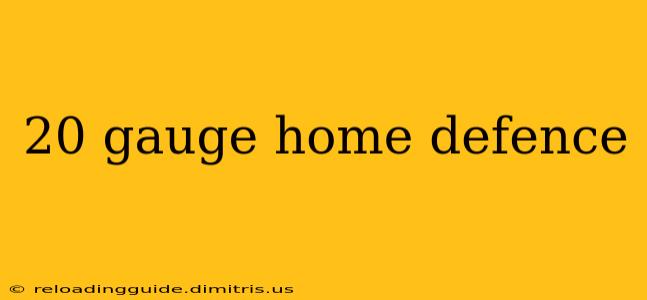Choosing the right firearm for home defense is a crucial decision, demanding careful consideration of various factors. While shotguns are frequently recommended for this purpose, the 20-gauge option often gets overlooked. This comprehensive guide will delve into the pros and cons of using a 20-gauge shotgun for home defense, helping you make an informed choice.
20 Gauge vs. 12 Gauge: Key Differences
The most common comparison for home defense shotguns is between 12 and 20 gauge. The primary difference lies in shell size and resulting recoil. 12-gauge shotguns pack a significantly harder punch, delivering more stopping power but with considerably more recoil. This recoil can be challenging for smaller individuals or those unfamiliar with firearms.
A 20-gauge shotgun offers a lighter recoil, making it more manageable for extended periods and easier for less experienced shooters to handle effectively under stress. The reduced recoil translates to faster follow-up shots, crucial in a home defense scenario.
Advantages of a 20 Gauge for Home Defense
-
Reduced Recoil: As mentioned, the lower recoil is a significant advantage. This allows for quicker target acquisition and more accurate shot placement, particularly during stressful situations. This is especially beneficial for smaller or less physically strong individuals.
-
Manageability: The lighter weight of the 20-gauge shotgun and its ammunition makes it easier to maneuver and handle in tight spaces, a common characteristic of home defense situations.
-
Less Noise: While not drastically different, the 20 gauge generally produces slightly less noise than a 12 gauge, which can be a minor advantage in a confined space.
-
Ammunition Availability: While maybe not as widely available as 12 gauge, 20 gauge ammunition is readily accessible at most sporting goods stores and online retailers.
Disadvantages of a 20 Gauge for Home Defense
-
Less Stopping Power: The smaller shell size means less payload and, consequently, less stopping power compared to a 12 gauge. This is the most significant drawback.
-
Limited Choice in Ammunition: While readily available, the variety of 20 gauge ammunition, particularly specialized home defense rounds, may be less extensive than that of 12 gauge.
-
Penetration Concerns: While not an inherent fault of the 20 gauge itself, the potential for over-penetration with certain ammunition types remains a concern, just as with any firearm used in a home defense scenario. Choosing the right ammunition is paramount.
Ammunition Considerations for Home Defense
Selecting the right ammunition is crucial regardless of gauge. For home defense, look for defensive loads with a focus on minimizing over-penetration. Buckshot remains a popular choice, but consider the number of pellets and their size for optimal effectiveness within a home environment. Slugs should generally be avoided in home defense due to their high penetration risk.
Choosing the Right 20 Gauge Shotgun
When selecting a 20-gauge shotgun, consider the following:
-
Pump-Action vs. Semi-Automatic: Both offer advantages and disadvantages. Pump-actions are generally more reliable, while semi-automatics provide faster follow-up shots.
-
Barrel Length: A shorter barrel is generally preferred for home defense due to maneuverability, but this will slightly affect patterns and effective range.
-
Overall Length and Weight: Choose a firearm that feels comfortable and easy to handle for you specifically.
Conclusion: Is a 20 Gauge Right for You?
A 20-gauge shotgun can be an effective home defense weapon, particularly for individuals who find the recoil of a 12 gauge too powerful. However, the reduced stopping power must be carefully considered. Ultimately, the best choice depends on individual factors, including physical strength, shooting experience, and comfort level. Thorough training and understanding of the weapon and its limitations are absolutely essential before deploying it for self-defense. Remember, responsible gun ownership and proper training are paramount.

